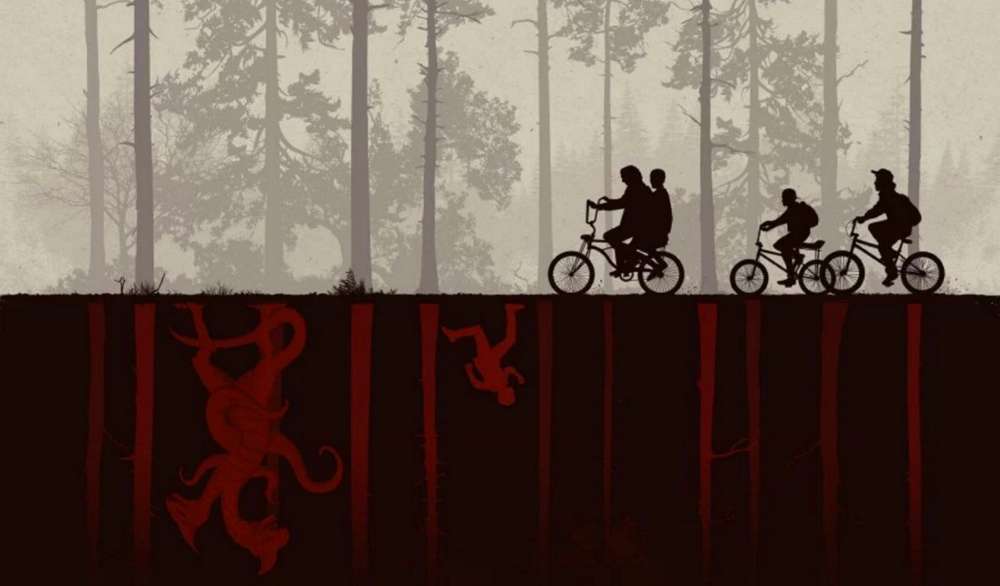Welcome to the Upside Down
July 18, 2017Categories: Logically Fallacious,

The Dr. Bo Show with Bo Bennett, PhD
The Dr. Bo Show is a critical thinking-, reason-, and science-based approach to issues that matter. It is the podcast of social psychologist Bo Bennett. This podcast is a collection of topics related to all of his books. The podcast episodes, depending on the episode, are hosted by either Dr. Bennett or Jerry Sage, discussing the work of Dr. Bennett.
I remember a bit from one of my favorite comedians, Eddie Murphy, in his video titled Raw. Without getting nearly as graphic as Eddie or being nearly as funny, I will paraphrase the joke: he talks about how a woman gets to be so enamored with a man that she can catch him in bed with another woman "butt-naked," then storm out of the room. When she confronts the man the next day, he would simply deny it.
Then after a few back-and-forths, the woman would say "maybe it wasn't you." Although written as comedy, there is a lot of truth in this bit, specifically, the idea that our passions, desires, and biases (i.e., emotions) can be so powerful that it can make us believe that what is clearly true to others, is clearly false to us. Perhaps this problem is worse now than in the past because political partisanship is at an all time high, and many things have become politicized including religion, climate change, and social issues. To use a term from the Netflix series, Stranger Things, it seems like we are living in the "upside down."
Here is the formula to turn any fact upside down:
Emotion + Ambiguity = The Upside Down
This is the exact strategy that flat earthers use to convince people the earth is flat, creationists use to convince people that the world is only about 6000 years old, and climate change deniers use to convince people that 97% of the world's climatologists are wrong (and Alex Jones and other political commentators are right). Let's look at a couple of recent examples and then see how we can use this same formula to deny just about any fact.
Let's start with the new narrative that "everyone is racist." Racism has historically been understood as having a sense of superiority for one's own race. But there are other definitions of racism, including simply "racial prejudice or discrimination." Generally speaking, the fewer terms, the greater the possibility for ambiguity. Now sprinkle in the desire for racism to be more prevalent (the bigger the problem, the more attention it will get), and the idea that everyone is racist because we all have inherent preferences to people who are like us, becomes a fact. Yes, in the upside down, both you and the leader of the KKK are racists. Deal with it.
How did Donald Trump become the new icon for Christians? Emotion + Ambiguity. No matter what you think of Trump's politics, or how good he might be for Christian causes, any reasonable person not blinded by emotion should see that he is far from a Jesus like figure (at least how Jesus is commonly understood within mainstream Christianity). But if the desire is there to make Trump the ideal Christian leader, the ambiguity is certainly there in the theology. The common claim is that God often uses flawed people to carry out his will. So in the upside down, the ideal Christian leader can also be the worst Christian.
Now let's say that we are horrified by a new trend of slapping old ladies in the face. Assault isn't a big enough word for this... we want to call it murder. How do we do this? Murder requires the wrongful killing of another human being. But what does it mean to be human? What does it mean to die? By slapping an old lady, you are killing her human spirit, therefore, it is murder. Go ahead, laugh at the absurdity. We are all (most likely) thinking clearly about this example because we are not blinded by emotion and driven to unreasoning by passion. We are not motivated to dig deep and stretch the ambiguous parts of the definition to satisfy an emotional itch. Slapping and old lady, as wrong as it may be, is not murder. We are in the right side up.
Next time you are engaged in an argument, ask yourself if you are creating the upside down. Is this an emotional issue for you? Are you exploiting the ambiguity of a definition to fit your needs? You just might be.